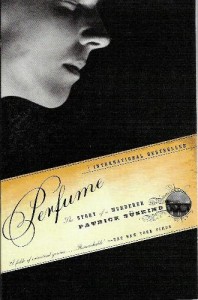A Smelly Book
 Suskind, Patrick (1986). Perfume: The Story of a Murderer. New York: Vintage. (Translated from the German by John E. Woods.)
Suskind, Patrick (1986). Perfume: The Story of a Murderer. New York: Vintage. (Translated from the German by John E. Woods.)
It’s difficult to conceptualize smells and to describe their essence in writing. Even familiar smells, like coffee or lemon, are difficult to bring to mind. To describe them, about all you can say is “coffee” or “lemon.” But Suskind presents remarkably complex and layered descriptions of smells that make you understand smell in a new way. He’s a master of synesthesia in that sense.
The central idea of this novel is that an impoverished, gnome-like man in mid-1700’s France discovers that he has no personal smell, even while he has a nose more sensitive than any dog’s. He can navigate the streets of Paris in total darkness just by following the flumes, ribbons, and balloons of smell everywhere. And cities really did stink in those times before toilets and bathtubs. So the protagonist, G., doesn’t stink, but he smells.
What could be more perfect for G. than to become a perfumer? So that’s what he does, eventually making his fortune synthesizing exotic fragrances “by nose.” However, he discovers that not having a personal smell makes other people ignore him, so he sets on the quest to make the perfect “human smell” for himself. Unfortunately, that requires him to murder flocks of young virgins, and thus the subtitle of the book.
The interesting parts of the story are the descriptions of how perfumes were made during that period, and the descriptions of the stinking cities and their cruelly hierarchical societies. The arc of the main character G., parallels that of Frankenstein’s monster, with a whiff of Phantom of the Opera. An element of magical realism is skillfully woven, as G. performs amazing olfactory feats that defy literal realism. Ultimately, the scent of “human being” he seeks seems to be “essence of love” or possibly, “essence of adoration.” That’s what he really wants.
The writing is average, notwithstanding the long, often tedious lists of odors presented. Suskind overwrites severely, restating what has been stated, explaining the obvious, and clarifying what has been shown. This could be a translation problem, I have no way of knowing. But the writing is by no means lyrical or transcendent. On the contrary, it seems to revel in the muck of everyday detail. I did have to use my dictionary a few times, so that was good. (Eleemosynary is a very fine word, I discovered). Plotting was ridiculous, because there were so many effects without causes, and causes without effects. In the last half, the story line was so arbitrary, it became unintentionally laughable.
People say the book and the character of G. were memorable but I disagree. Aside from the clever conceit of a man with the nose of a dog, there is nothing here to remember – no haunting characters, no believable drama, no illumination of the human condition, no lyrical writing, no echoing dialog, no clever plot. And we don’t remember odors well, so those are already gone. I think the book will be about as memorable as child’s fairy tale, which is mostly what it is.
